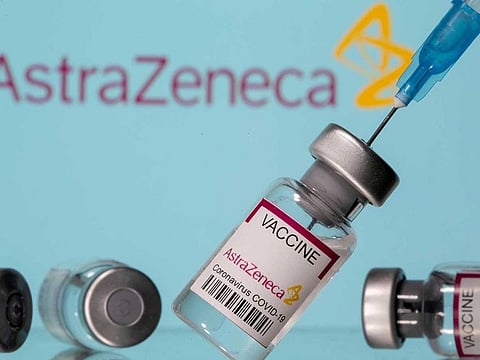COVID-19: Saudi Arabia records 7 blood clots possibly associated with Oxford-AstraZeneca vaccine
Benefits from jab still outweigh potential risks, says Saudi drug watchdog

Abu Dhabi: Saudi Arabia has recorded seven blood clots possibly associated with the Oxford-AstraZeneca COVID-19 vaccine, after receiving 34 complaints from vaccine recipients over side effects, local media reported, quoting the Saudi drug watchdog.
The Saudi Food and Drug Agency, however, said the immunological platelet deficiency and clotting syndrome associated with AstraZeneca vaccine has not been confirmed in any of these cases so far.
The Saudi FDA estimated the rate of occurrence of these symptoms in conjunction with the administration of the Oxford-AstraZeneca vaccine in the Kingdom is very rare.
It confirmed that the desired benefits from administering the vaccine still outweigh the potential risks according to the medical information approved for the vaccine, and that all vaccines approved in the Kingdom are of high safety
The Saudi FDA recommended the vaccine recipient should consult the treating doctor or go to the nearest health center when any of the following symptoms appear and continue for more than three days after receiving AstraZeneca:
(dizziness, severe and persistent headache, nausea or vomiting, impaired vision, shortness of breath, severe pain in the chest or abdomen or coldness in the extremities, swelling of the legs, small blood spots under the skin at the injection site)
Denmark has ceased giving the Oxford-AstraZeneca amid concerns about rare cases of blood clots, the first European country to do so fully.
Drug watchdog the European Medicines Agency last week announced a possible link with clots but said the risk of dying of COVID-19 was much greater.
Several European countries had previously briefly suspended the jab.
Most have now resumed vaccinations with AstraZeneca, but often with limits to older age groups.
Last week, the US, Canada and the European Union paused the Johnson & Johnson vaccine for similar reasons over clotting.
South Africa has also paused its use, despite the Johnson & Johnson being its preferred vaccine because of its effectiveness against the South African variant.
For both AstraZeneca and Johnson & Johnson, the blood clot side effects are extremely rare.
Sign up for the Daily Briefing
Get the latest news and updates straight to your inbox







